- Author Matthew Elmers elmers@military-review.com.
- Public 2023-12-16 21:49.
- Last modified 2025-01-24 09:17.
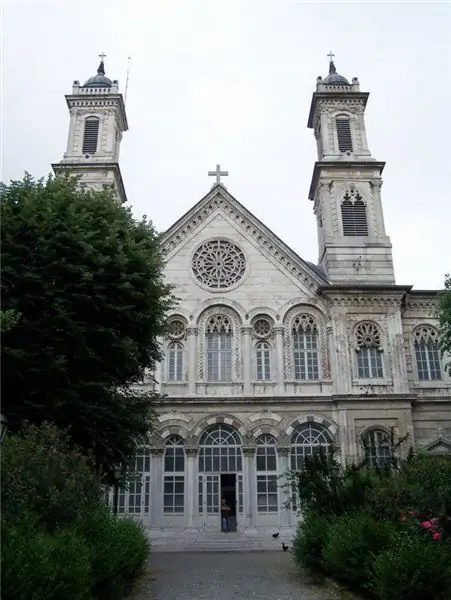
Holy Trinity Church in Istanbul
The district judge's estate was located 20 versts from Lutsk. After Kiev, Maria Mikhailovna liked everything here - both the big house in the estate and the servants. The children had their own rooms, and a large family gathered for dinner or for concerts, which were staged in turn by children and artists specially hired by the county judge. Neighbors often came to the estate, and then the general tea drinking and fun lasted a very long time.
One evening, his wife quietly whispered in Ivan Stepanovich's ear that they would have a daughter next May. Ivan Stepanovich smiled, kissed Maria Mikhailovna and asked: why daughter? To which his beloved replied that she felt so.
Several days of serious work in the court on current cases passed, and then one morning a courier arrived from the Governor-General with a secret package, from which it followed that, before the arrival of the military court commission, it was necessary, together with the police, to urgently organize a search for an emissary of the secret society "Commonwealth of the Polish People" Kazimir Sonarsky, who, under the guise of a landowner with a servant, traveled around the southern provinces of Russia and, establishing contacts with wealthy Poles, tried to turn them from a peaceful life to the path of terrorism. The emissary's nickname was Xeard, he was armed and very dangerous. On his account, several murders of Poles have already been recorded, who refused to finance his activities and buy outrageous books. Together with the police department and members of the military court commission, it was ordered to notify trusted people in farms and villages in order to catch a state criminal.
After such notification, the district court began its round-the-clock work. The current cases and investigations into them had to be postponed, although the “Cloth case” of the entrepreneur Khayyam Lazer is very interesting and profitable for Russia, it was extremely worried about both the investigators and Desnitsky himself. But the direction of the Governor-General was above all. Every day, court officials, police officers and two officers from the battalion provided surveillance at the county key points. The marinas and steamers did not stay aside. And then the first results appeared. On one of the steamers, a person similar to the description from the circular was recorded, but only with a son, and not with a servant. According to the report, on deck, sitting in an armchair, he read Mickiewicz's book "The Book of Polish Pilgrimage." This Pole got off the ship and settled on the estate of the landowner Yelensky. Now it was possible to establish round-the-clock surveillance. Helensky himself was not liked by the surrounding German, Czech landowners and Jewish entrepreneurs for his quarrelsome character. Therefore, observers were quickly found for a low fee.
The district judge began to receive notes on a regular basis with full information about who comes to Yelensky and what time they spend at the estate. Interesting material gradually emerged. It was possible to write a memorandum to the commission of the military court. And this was done three months later, at the same time all the facts were collected that allowed conducting the trial with positive results, even in the case of hiring influential lawyers from the accused side. After reading the report of Ivan Stepanovich, the Governor-General, after considering it, approved the line of the accusation lined up. The trial was conducted in accordance with all the rules and legislation of the Russian Empire. As a result, the accused, depending on the degree of guilt, were recognized as state criminals of the 1st, 2nd and 3rd categories with confiscation of property and exile to Siberia.
For one of the defendants, in view of his remorse and admission that he did not know about the emissary's plans, the court decided to keep his estate, but put him under police supervision. This process elevated Ivan Stepanovich in the eyes of the provincial authorities, rumors spread about his imminent transfer to the capital.
Unbeknownst to everyone around in the Desnitsky family, Katenka was born, who was baptized in the church of Father Seraphim. The family with the appearance of a daughter somehow immediately increased. New concerns captured everyone, even the brothers. And surprisingly: after a few months the baby girl began to recognize them all, when the brothers approached the crib, she began to move her arms and legs. And when Katya was seven months old, she was already smiling at them. The brothers told her about household chores, about the dogs living in the yard, the cat chasing the nanny, and all sorts of other little things. Mom and nanny often had to send the children to their rooms for classes. After the birth of Katenka, the landowner Heinrich Stolz became a frequent visitor to the Desnitsky estate. As usual in the districts of Russia, the neighbors were friends with families, celebrated holidays and name days together. So a year passed, the second. Katya, when the brothers were at home, did not leave them. But now it was rare, classes and all sorts of rehearsals took up all the daytime. Ivan Stepanovich often went to the governor on business and was summoned to St. Petersburg several times. Then everyone was waiting for his return, and upon arrival they arranged holidays.
One evening, together with the investigator, Ivan Stepanovich was returning to Lutsk, after visiting the distant estate of one of the criminals. As they drove past an overgrown ravine, two shots rang out almost simultaneously. The horses galloped off, at the entrance to the city the horses were stopped at the outpost. The sentries, having illuminated the wagon with a lantern, established that the two riders were dead. The alarm was raised, cavalrymen arrived at the outpost, who immediately rushed along the road where the wagon with Ivan Stepanovich was just driving. No one was found, and the search was postponed until dawn. After three days of search operations, nevertheless, the detectives managed to track down two suspicious persons 10 miles from the site of the tragedy. These men were waiting for boarding a steamer, while trying to check their documents, they rushed to run away. Secret agents had to use weapons, and those fleeing were killed. It turned out that they were Polish terrorists.
A few months later, Maria Mikhailovna, with the help of her relatives living in Kiev and her brother Ivan Stepanovich, sold the estate, bought a nice house in the center of Kiev and left to live there. The upbringing of 11 children has become the common concern of all relatives. Gymnasiums, commercial schools, cadet corps became the place where the children of the Desnitsky family prepared for an independent life. Katya continued to live with her mother, and when the time came to choose a place of study, all the relatives stopped at the Fundukleevskaya gymnasium.
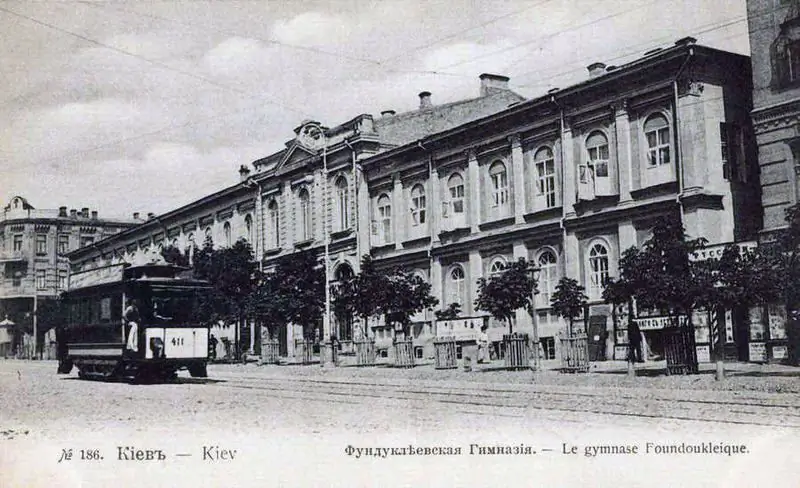
Fundukleevskaya women's gymnasium
The family seemed to have forgotten about Lutsk; they also tried not to remember Ivan Stepanovich. It was only when family members were alone that muffled sobs and soft sobs could be heard. So the wonderful life of all ended immediately with his death. Yes, it was impossible to repeat this life again.
Katenka's studies in the gymnasium proceeded as it should be at that time. In her senior class, Katya had an admirer, Igor, who, after graduating from his gymnasium, decided to become a cadet. In 1903, Katya's mother died, and the girl, with the permission of her uncle, leaves for St. Petersburg with her godmother. Katya will live on Millionnaya Street in the city center. Her godmother, the wife of a retired general, was very sociable and often collected the flowers of St. Petersburg youth. Here young people organized concerts, talked, and sometimes even arranged balls. During these concerts, Katya met a St. Petersburg celebrity - singer Anastasia Vyaltseva. The girls became friends, although Vyaltseva was a little older than Katya. Acquaintance with the chosen Vyaltseva officer Vasily Biskupsky also took place in the godmother's house.
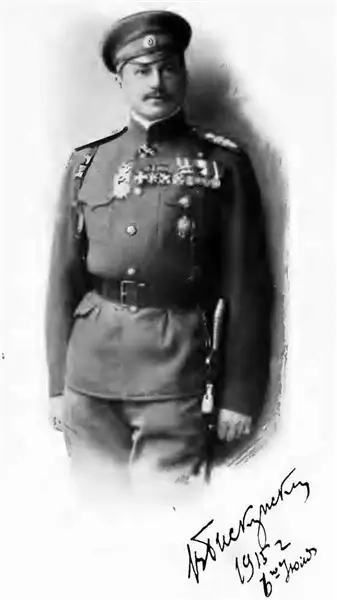
Vasily Biskupsky
During one of the conversations, a young cornet of the Imperial Life Guards Regiment, Chakrabon, approached them. Biskupsky introduced this officer to Catherine. From that moment on, the love affair of young people began.
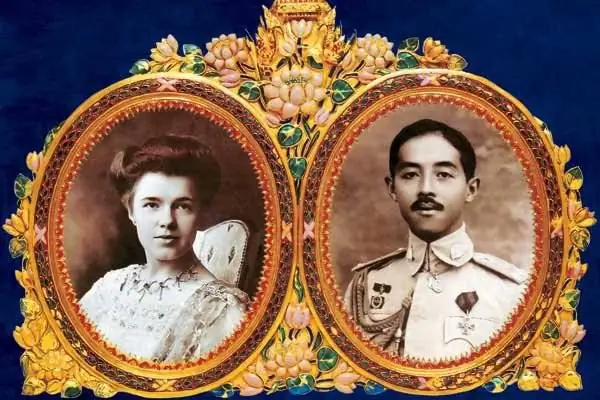
The pre-war situation was felt in the country, and Katya, instead of studying at the university, went to study in nursing courses. She decided to devote herself to medicine. The courses were combined with the work of a nurse in a hospital. During the war, Anastasia Vyaltseva, at her own expense, formed an ambulance train, where Katya was also registered as a nurse.
Train trips to the front began, Katya sometimes had to stay in places of hostilities due to the lack of nurses. For such an attitude towards saving the wounded and for her courage, Catherine was presented to the award - the St. George Cross of the IV degree. And in St. Petersburg Chakrabon was waiting for Katya. His tsar did not allow the troops in the Far East, so the prince had to graduate from the Academy of the General Staff and prepare to leave for his homeland. After graduating from the academy, Chakrabon was awarded the military rank of colonel of the Russian army. Officially, in the presence of the godmother, the prince proposed to Katya to marry him. Tsar Nicholas II diplomatically remained silent, but the Special Section of the Police Department approved such a proposal.
One of the conditions for the marriage was the need for the prince to switch from the Buddhist faith to the Orthodox. The Prince of Siam agreed to everything, so great was his love for the young Russian woman. The young people left Petersburg for Odessa, and then on a steamer to Istanbul. Here, in the Church of the Holy Trinity, their wedding took place. From the day of their departure from St. Petersburg, the prince and Katya were accompanied by two agents, whom the Special Section of the Police Department secretly assigned to them. These agents constantly relayed all the information about the newlyweds' movement in Siam. The government of the Russian Empire paid attention to this marriage, there was a hope that it would be possible to strengthen the position of the Russian state in this part of the globe. This was especially necessary after the defeat of the war with Japan.
The population of the state of Siam was almost a third of the population of the Russian Empire, and the rule of the king in this country was unquestioning. With a certain development of events, the Siamese throne could be occupied by a graduate of the Russian military academy and the husband of a Russian noblewoman.
P. S. But the events of later life developed in such a way that Chakrabon did not become the king of Siam (Thailand). Katya and the prince had a son, Chula. After a while, Katya and Chakrabon parted, a happy life together did not work out. Katya left Thailand, lived for some time in the USA, then in France. Chakrabon died of pneumonia. The son grew up, but had little contact with his mother. Vasily Biskupsky also died in exile in a foreign land. Anastasia Vyaltseva, Russia's favorite, is buried in the Alexander Nevsky Lavra.
The role of the Special Section of the Police Department of the Ministry of Internal Affairs of the Russian Empire proved to be unsuccessful. Only after World War II did our country establish diplomatic ties with Thailand.
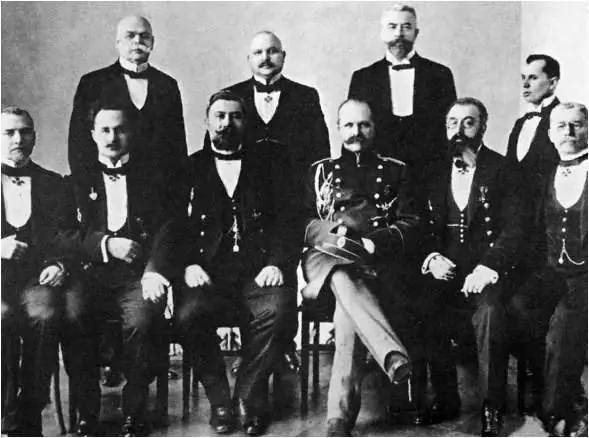
Heads and officials of the Police Department (second from the left in the first row - S. E. Vissarionov)






